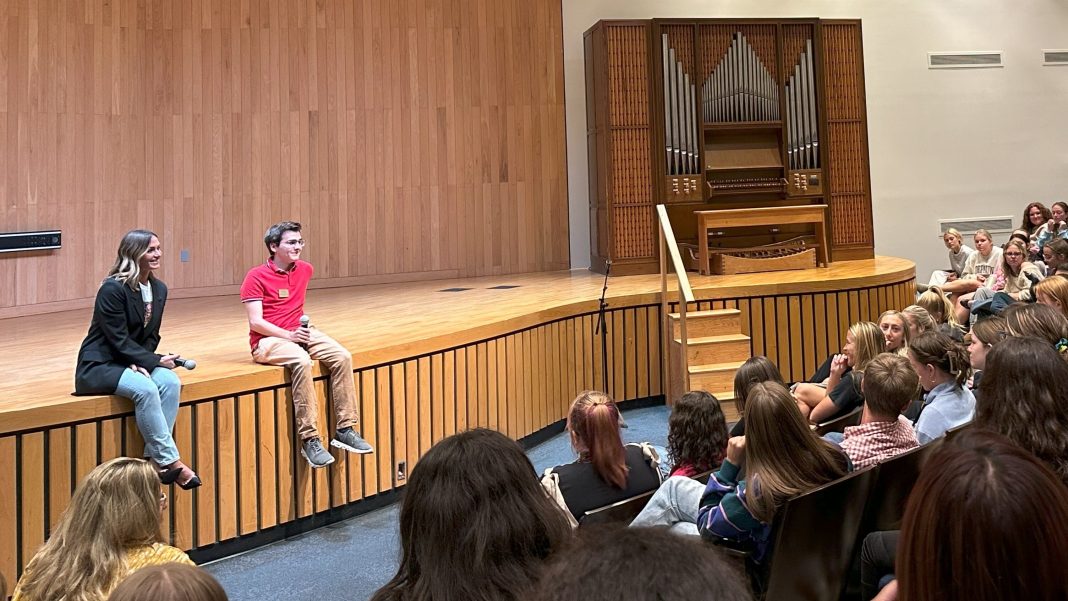When Kyle Smitley ‘07 introduced her Sept. 9 Dorothy Garrett Martin Lecture on what it means to be a good person in school, work and life, she framed morality in relation to a children’s book called “Pleasant Fieldmouse.” In this book, a mouse hosts a picnic, and the invitations read: “Picnic on Tuesday. Good People Only.”
In the end, no one came to the picnic because everyone doubted their own goodness. Smitley then asked an important question to the audience: “Would you be invited to Pleasant Fieldmouse’s picnic?
Smitley certainly has the credentials to be invited. After graduating from DePauw University, she founded a children’s clothing brand, attended law school, sold her brand and went on to establish the Detroit Achievement Academy. She was named one of the 30 Coolest Entrepreneurs Under 30 by Inc. Magazine and Top 10 Entrepreneur to Watch by Forbes.
But Smitley does not care about achievements or accolades — she cares about being good and doing good.
For her, everything became clear in the Introduction to Philosophy class she took her first semester at DePauw. She described herself now as “...a stickler for morality, for doing the right thing when no one is watching, for using (her) position and (her) privilege to hold a high bar for others.” This moral conviction led her to sell her company, donating $9 million of the sellout in the process. She realized she wanted “... a life of purpose, a life where you could work really, really hard, but you could see something in the world actually improve.”
After she stopped measuring goodness by tangible successes, Smitley realized she could do more. Yet, there were roadblocks. People’s egos often made them want her to fail, and she had to hold on tight to her moral compass as she tried to improve the school system in Detroit, Michigan. Those who advocated against her were often the ones who frequently spoke of their own goodness, according to Smitley. They believed so deeply that they were the ones who deserved to go to the picnic, but ultimately, the people who opposed her were not acting with integrity and were not invited to the picnic.
Smitley, however, admitted that she was not always so wise. She splits her life into two parts: the first part is when she was just Kyle, a college student ingrained in group think mentality; and the second, when she became “ethically mature Kyle.” She explained, “ethically mature Kyle thinks that we absolutely must proactively dissolve the lens of group think, of ‘go along to get along,’ of the idea that being vanilla and appropriate all the time is good.”
Smitley understands what it’s like to be a student at DePauw. She understands the struggles of social media, achievement culture and group think. She also, however, understands that curiosity is a core value of DePauw University.
She believes that morality doesn’t lie in donating or changing the world. “Wake up. It’s 2024,” Smitley said. “Leave your office and go outside and look at the world.”
She suggested that all it takes is three things: be honest with yourself and others, don’t intentionally harm others, and just go out and do it, whatever “it” may be. For DePauw students, this may mean asking questions in class, helping a friend or simply getting off social media and fully immersing oneself in the community.
So, would Smitley be invited to Pleasant Fieldmouse’s picnic? She said, “It depends. It depends on when you’d ask me. Today, yeah. I’m there, and I brought my bluetooth speaker.” Yet, she acknowledged that there are times when she’s been the bad guy, when she’s failed to have integrity or has done things for her own benefit. But as long as you take action, act with integrity and stay true to your value system, you can go to the picnic. Even if you don’t meet the standard 100% of the time, you can still go to the picnic.
“You are going to be forever curating your own personal picnic,” Smitley said, “where you get to decide the type of person you want to be and who you want in your life.”
Even if you don’t always succeed at being good — and you won’t — you should continue questioning yourself, asking: Am I invited to Pleasant Fieldmouse’s picnic? And more importantly, “Why?”

